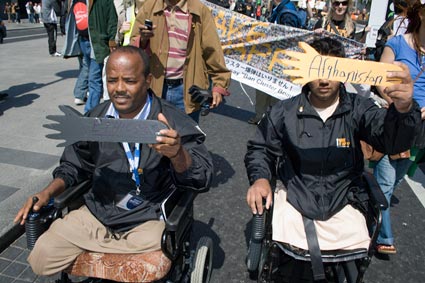At an historic conference in Dublin this week, 111 countries agreed to a near-complete ban on the use of cluster munitions.
After 10 days of talks, and much lobbying and pressure from groups such as the International Committee of the Red Cross, delegates reached an agreement which is set to be ratified by their countries in December.
The agreement recognizes that there are a number of problems with cluster munitions. In particular, they spread deadly explosives over a large area which remain dormant on the ground. Unexploded ordinance spread in this way can pose a danger to civilians even many years after the conflict is over. In this respect, they are akin to landmines, which were banned by 158 countries under the Ottawa Treaty.
Signatories at the Dublin Conference will be required to stop manufacturing the weapons and will also have to destroy their existing stockpiles. Countries that have actually used cluster bombs in the past will also be required to assist in cleaning up the unexploded ordinance that they created. Though not all cluster munitions were banned, those that are still allowed to be used are required to have a self-destruct or self-neutralizing mechanism.
Unfortunately, not all of the major world military powers signed the cluster munitions ban on May 29th, 2008. Notably absent were The United States, China, Japan, Russia, India, and Israel.
The United States, one of the primary manufacturers and users of cluster munitions has been the subject of much criticism for refusing to participate in the Dublin process.
Some lawmakers have stepped up efforts to encourage the U.S. to sign on to the ban. That was the subject of a joint resolution introduced on June 3rd by Sen. Dianne Feinstein, Sen. Patrick Leahy, and Rep. James P. McGovern. The text of the resolution acknowledges that:
“Civilians make up 98 percent of those killed or injured by cluster munitions of which more than 25 percent are children.
…
“[and that in] Laos alone there are millions of unexploded submunitions, left over from United States bombing missions in the 1960s and 1970s, and approximately 11,000 people, 30 percent of them children, have been killed or injured since the war ended.”
However, State Department spokesperson Tom Casey is quoted as saying:
“While the United States shares the humanitarian concerns of those in Dublin, cluster munitions have demonstrated military utility, and their elimination from U.S. stockpiles would put the lives of our soldiers and those of our coalition partners at risk.”
Despite the refusal of the United States and other military powers to sign on to the ban, the Dublin Conference was largely a success. This is especially so from a moral perspective: the international community has sent a clear signal that cluster munitions are intolerable and that using them will draw international condemnation and backlash.
Even those countries that have chosen not to sign the cluster munitions ban will be under significant pressure to avoid their use. According to the Christian Science Monitor:
“Activists are hopeful that the treaty will influence nonsignatories, pointing to the 1997 ban on land mines. Of a handful of nations – including the US – that didn’t sign it, only Burma still uses land mines, says Simon Conway, co-chair of Cluster Munitions Coalition.”

